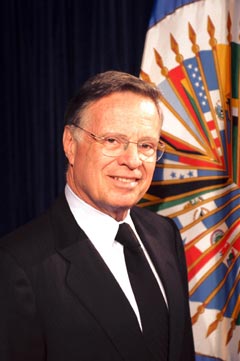|

Former Costa Rican President Miguel Angel Rodríguez was
elected OAS Secretary General by consensus of the member states during the 34th
regular session of the OAS General Assembly, held in June 2004 in Quito,
Ecuador. He took the helm of the OAS on September 15, 2004, but resigned a
month later.
Rodríguez has an extensive background in government,
business and academia, and wide-ranging experience in international affairs. As President of Costa Rica, from 1998 to 2002, he focused on improving
economic growth, lowering inflation and expanding trade. A champion of human
rights, he created a cabinet-level ministry on the status of women and
spearheaded the Responsible Paternity Law to ensure paternal recognition and
support for children born out of wedlock. As a legislator, he promoted a law
that opened the door for indigenous people to obtain official identification
documents and thus gain full access to their rights as citizens.
Rodríguez earned undergraduate degrees in economics and law
from the Universidad de Costa Rica, as well as master’s and doctorate degrees
in economics from the University of California at Berkeley. In the late 1960s,
he was Minister of National Planning and then Minister of the Presidency, while
also serving on the board of Costa Rica’s Central Bank. In the 1970s and 1980s
he worked in the private sector, heading a cattle company called Grupo
Ganadero Internacional, S.A. and taking a leadership role in national
business organizations.
In 1990, Rodríguez began his first term to elected office,
serving as Congressman of the Legislative Assembly until 1993 and President of
that legislative body in 1991 and 1992. A longtime leader of the Christian
Democratic Party in his own country, he was President of the Christian Democrat
Organization of America (ODCA) from 1995 to 1998, after having served as a Vice
President of that organization in the early 1990s.
Over the last four decades, Rodríguez has also stayed active
in the academic field, teaching at the Universidad de Costa Rica and the
Universidad Autónoma de Centro América, and publishing numerous books
and articles on economic, social and political issues. From 2002 to 2004, he
was the J.B. and Maurice C. Shapiro Visiting Professor at the Elliott School of
International Affairs at The George Washington University in Washington, D.C.
He has also served in recent years on the board of the International Foundation
for Electoral Systems (IFES) and on the advisory council of the Initiative for
Policy Dialogue, and chaired the Global Advisory Group of Manatt Jones Global
Strategies, a consulting firm.
Rodríguez was born in San José, Costa Rica, on January 9,
1940. He and his wife, Lorena Clare Facio de Rodríguez, have three children and
three grandchildren.
|


